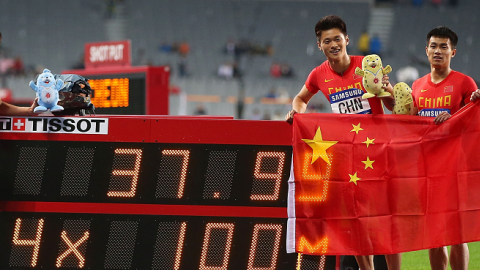The 17th Asian Games in Incheon, Republic of Korea (or South Korea) concluded over the weekend – not that you would know about it given the lack of reporting of what is a forty-five nation Olympic Committee-sanctioned event in the region.
If Australia was included as it should be – given that the ‘Asian Games’ invites countries as far away as the Middle East – then we would see the results on our back page.
But I digress … The final medal tally emphasised Chinese dominance with 342 medals, 100 more than host South Korea. China won 151 gold medals compared to South Korea’s 79, again second place on this count.
Why is China so good at international meets, remembering that it was placed second behind the United States at the 2012 London Olympics? It largely comes down to ‘who cares more wins’. And when it comes to international events, China cares just about more than any other country that its athletes win medals.
Let’s first dispense with the argument that China’s dominance is largely a function of its population size. If that were true, then India should be doing better than its 11 gold medals and 57 medals overall. Indeed, Kazakhstan with a population of about 17 million people won 28 gold medals and 84 medals overall.
What about the argument that richer countries do better because they have access to better facilities, equipment, tertiary educated professional trainers and other bells and whistles?
There appears to be some truth to this argument. If we look at the 2012 Olympic Games, eight of the top ten countries were rich countries on a per capita basis. The two that are not – China and Russia – are nevertheless economies with the size and scale to pour significant money into their athletes.
As Australia’s sports mad Prime Minister Bob Hawke proved when he dramatically increased central funding for sports, there is a direct relationship between winning gold medals, cricket and rugby world cups on the one hand, and hard cash invested in athletes on the other.
Britain did just that when it exceeded its normal rankings and came third at the last Olympic Games in London – it was preceded by London pouring unprecedented money into ensuring a good performance as host. And likewise China in the funding efforts made to top the medal count at the 2008 Games in Beijing.
So money matters. But so do a couple of non-material factors. Take China and the Democratic Republic of Korea (or North Korea). Despite being an impoverished hermit kingdom, the latter came 7th in the Asian Games, and a very respectable 20th at the 2012 London Olympic Games. Not bad for a country with an entire GDP of about $US40 billion and a GDP per capita of about $US1,800 each year.
If one looks at these two over-achievers, one common factor comes down to political motivations for success. North Korean insecurities about its political-economic system are obvious. But despite its spectacular rise, China still wants to prove to the rich and advanced west that its political-economic system is worthy of praise and respect if not emulation.
Authoritarian governments tend to do this by pointing to tangible symbols of national success: world’s tallest building; world’s biggest shopping mall; world’s fastest train; world’s leading nation in international athletic meets etc.
So the first factor is national ambition, driven by political leaders seeking to prove something to the world.
But mere ambition is not enough. And this is where some unique characteristics of Chinese (and North Korean) society come into play. In countries like Australia, America or the United Kingdom, talented athletes have a range of options. Some sports are purely national in scope (such as Aussie Rules or gridiron) and others are played seriously by only a handful of countries (such as the rugby codes and cricket) and attract limited interest outside those countries.
Importantly, striving for fame, glory and wealth on the sporting field is primarily a private affair, not a national one even if athletes proudly wear the national colours and represent their country.
In contrast, and in making funding decisions, governments in Beijing and Pyongyang begin by first identifying which events offer the most prestige for their country should their athletes excel. They do not first ask which sports the population wants to play and watch in making funding decisions.
Beijing and Pyongyang have identified events such as the Olympic and Asian Games as meets that will deliver international glory to, and respect for, the country.
The next step is to identify events where they can excel and beat the opposition. If one looks at the sports that China does well at, they tend to be the more individualistic technical and artistic ones such as gymnastics, diving and weight-lifting. More than other events and sports, success is about gruelling technical and strength training defined by repetition, and requiring incredible hours devoted to that craft from a very young age.
It is in these sports where the systems in countries like China and North Korea (and before them the former Soviet Union and East Germany with the aid of state-sanctioned steroid and other drug programs) have an advantage.
Take gymnastics as one example. In one investigation of the famous Nanning Gymnasium in China, large groups of children as young as four years old were put through their paces, performing demanding routines on bars, rings and mats. Beyond the pure number of hours spent perfecting these arts, painful techniques which would be unacceptable to most in the west were applied to children crying out in pain as coaches stood on their legs to increase the child’s flexibility and suppleness.
As young children with talent are gradually identified, significant financial incentives are given to the families by the government to push the child into dedicated schools that develop the skills of that child in that particular sporting activity. If parents resist or prefer to use a private coach rather than a state-backed and sanctioned one, government pressure is often placed on the family to reverse the decision.
Meanwhile, the importance of getting to the podium one day is drummed into the young children going through their paces. There is a special emphasis on bringing glory to China by beating Americans for the gold medal at a future international meet.
Although there is now better regulation in China (but not North Korea) as to what coaches and sports schools can and cannot do to protect children, the point is that potential Chinese athletes at a younger age – with the full backing of the state – train harder and longer and endure more pain than those in other countries.
Finally, and at the other end of the scale, successful athletes are handsomely rewarded. China’s Olympic gold medallists are offered significant cash bonuses and luxury apartments. For example, swimmer Sun Yang received an apartment worth about half a million dollars for winning gold at the London Olympics. He was also given about $US400,000 cash. Sun was only one of many gold medallists given substantial property and cash rewards – a significant boon when per capita GDP in the country is still around $US8,000.
China began rewarding successful Olympic athletes in 1984 when it participated for the first time after regaining its seat on the International Olympic Committee in 1979. In 1984, a gold medal automatically earned an athlete 6,000 yuan. This was raised to 15,000 yuan in 1988, and reached 200,000 yuan in 2004. The cash rewards in 2008 and 2012 were not publicised but it is believed to be significantly larger than what was received in 2004. Clearly, such material incentives mean more in a country where earning a comfortable living is still a rarity rather than an expectation as it is in the west.
If hard work and determination is the standard, Chinese athletes certainly deserve all the success they achieve. But the Chinese system -- in particular the state’s motivation and role in backing successful athletes in international events -- is not one able to be replicated in most countries. The next time an Australian gymnast or perhaps even a swimmer is bested by a Chinese competitor, we know why.
















